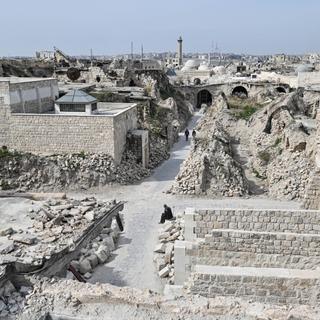


Aleppo's ancient market is now a pile of ruins
FeatureOnce situated on the front lines during the civil war, the medieval souk, the former bustling heart of northern Syria's major city, is now largely destroyed. While a few dozen shops have been restored with foreign funding, customers remain elusive.
Every morning, they come to greet each other. After sweeping the dust off the cobblestones, they set up a few plastic chairs in a semicircle and chat while counting their prayer beads. Their deep voices echo under the arches blackened by flames. "We meet up to chat, that's all! To say hello. As for the rest, look around you, everything is dead, commerce is dead. The war and the Assad regime destroyed everything. Aleppo is asleep," said Mohammed Imad Eddine in early March. His family owned a fabric stall here for more than a hundred years.
The ritual is the same every day. The last merchants of Aleppo's old souk gather in the deserted aisles of what was once the pride of Syria's economic capital. "We used to sell Aleppan fabrics to customers from all over the world, from Iraq, Azerbaijan, Jordan, and the Gulf. Business was good. Day and night, we prepared merchandise for the next day. We sold everything," he continued, walking through the ruins of his past life.
Located at the foot of Aleppo's citadel, this vaulted labyrinth, which stretched for 12 kilometers, housed more than 4,000 shops and about fifty caravanserais, some dating back to 300 BC. During the Ottoman era, Aleppo's market was one of the largest in the world. Perfumes, spices, precious stones, silk, and cotton were traded here, goods brought by caravans from India, Iran, or the Arabian Peninsula, which then headed to Venice or Rome via the Mediterranean.
Today, customers no longer venture into the souk. And even if they did, most merchants no longer have a shop to welcome them. Many were burned in the September 2012 fire that ravaged the old medieval city, the scene of violent clashes between the Syrian army and the rebels. "It was our heart that was burning. We couldn't save a scrap of fabric, not a single piece of merchandise. We never knew which side caused the fire," recounted Mohammed Imad Eddine in his former office, gutted by a missile.
You have 67.52% of this article left to read. The rest is for subscribers only.
